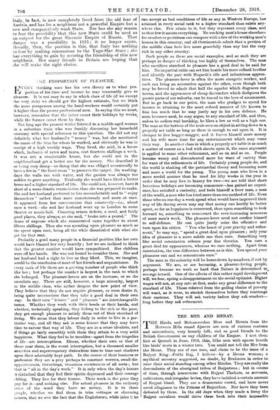ITALY AND THE YUGO-SLAVS. A LL friends of Italy and all
friends of the World-Peace are noting with grave anxiety the strained relations between Italians and the 'Yugo-Slays. The immediate causes of dispute are of relatively little importance. Some of the Italians are angry because the Yugo-Slays seized the Austrian Navy before the signing of the Austrian armistice, though it seems fairly obvious that this was a useful measure against the common enemy. Some of the Yugo-Slays are equally angry because Italian troops have occupied Fiume. But behind these momentary causes of dispute lies a fundamental issue that is difficult to settle. The issue can be very simply stated. Italian foreign policy has for many years past been largely inspired by the Irredentist Party, whose aim it has been to recover for Italy all those territories on the other side of the Adriatic that were once under the Venetian flag and are still to a considerable extent inhabited by Italians. As long as the Austrian Empire was in existence, this policy could well be defended on broad national grounds, for Austria's occupation of these unredeemed territories enabled her Navy to dominate the Adriatic, and thus keep Italy in complete sub- jection to the will-power of the Central Empires. The situation has changed with the collapse of Austria and the defeat of Germany, but the motives which inspired the Irredentist Party largely remain. They are motives of sentiment. Many of the members of this party themselves belong to, or have family connexions with, the unredeemed territories on the other side of the Adriatic. They have memories of persistent con- flicts with the Austrian Government and of extremely un- friendly relations with their Slav neighbours. It was, in fact, the policy of the Austrian Government to aggravate to the greatest possible extent the racial differences between Slays and Italians in order to secure their joint submission to the central bureaucracy in Vienna. The policy was so successful that it may be stated probably without exaggeration that the Irredentist Italians hated their Slav neighbours more than they hated the Austrian Empire, and reciprocally the Slays of Dalmatia and Croatia and the rest hated the Italians more than they hated Austria.
Unfortunately these animosities, fostered by the Austrian Empire, still to a considerable extent survive even now that that Empire is swept away. There has been a tendency among some British writers, notably the authors of certain articles in the New Europe, to place the whole blame for the existing tension upon the Italian Government. That is assuredly not a fair way of looking at the problem, and Italians may be excused for resenting this attitude somewhat bitterly. In all such racial quarrels as these there is a considerable amount of blame fairly attachable to both sides. It is probable that the Yugo-Slays in the first pride of their new nationalism are more than a little difficult to deal with, and they and their friends in Britain have gone a long way in the direction of making mischief between Italy and her staunch friends and Allies. On the other hand, the Italian Government have certainly not been blameless in the matter. In spite of the line taken by papers like the Corriere della Sera, which has consistently preached the necessity for friendship between the Italians and the Yugo-Slays, the Italian Government appear still inclined to insist upon the strict carrying out of arrange- ments made in the Treaty of London of 1915 under conditions entirely different from those now existing. This has come as rather a surprise to friends of Italy here, for it was generally understood that by means of the Pact of Rome in the spring of the present year the Italians and the Yugo-Slays had arrived at a complete settlement of their differences.
The crux of the matter is this, that the Treaty of London, which was the prelude to Italy's entrance into the war, assigned to Italy as her share of the prize of successful war, not only the Trentino and Southern Tirol up to the Brenner Pass, together with Trieste and Pola, the peninsula of Istria, and the counties of Gradisca and Gorizia, but also a large number of islands in the Adriatic and the whole of the province of Dalmatia on the Eastern shore. On the other hand, Fiume, which is now occupied by Italian troops, was specially reserved as a port for Croatia. It is not desirable hero to go into the complex details with regard to the almost unnumbered islands of the Adriatic. Apparently some of the Yugo-Slays themselves admit that certain of these islands ought to go to Italy, but they also claim that Italy is taking more than she 13 justly entitled to do. The clearest issue, however, arises over the question of Dalmatia. Here compromise appears to be very difficult between the Yugo-Slav claim and the claim of the Irredentists ; but all Italy is not Irredentist, and a good many Italians have openly advocated the abandonment of the Irredentist claim to Dalmatia.
The argument which they use is a very strong one. They point out that though there are undoubtedly many people of Italian blood living in Dalmatia, this fact is not conclusive.
In the first place, the Italians are a minority, except perhaps in two or three seaport towns secondly, though the possession of Dalmatia might conceivably give Italy additional naval security, it would certainly diminish her military security, for if she were to occupy Dalmatia she would virtually be advancing her frontier right into Slavonic territory, and she would have to maintain a large army to defend that frontier. The military argument is not, however, the only one. Beyond that is the commercial argument. Italy-is a growing industrial Power. Up to the outbreak of war she was developing her industries rapidly, and in some directions the war did not interfere with that development. Geography suggests that she should look for trade expansion to the countries across the Adriatic. The Slays are industrially and commercially less developed than the Italians, and Italy might win for herself an extremely valuable position throughout the Balkans by trading with, and helping the industrial development of, her Slavonic neighbours. It ought, however, to be sufficiently obvious to every Italian business man that such industrial and commercial progress as this will be impossible if Italy begins by quarrelling with the new Yugo-Slav State. In that event the Yugo-Slays will turn their eyes northwards, and will seek from Germany the support which hatred of Italy makes them refuse from the Italians. Is it worth while for the people of Italy to run such a risk as this ? We all want Italy to have perfect security, but this seems a bad road to it; In the Pact of Rome it was agreed that groups of Italians in Slavonic territory, and reciprocally groups of Slays in Italian territory, should be allowed to retain their national customs and language. Under this clause the interests of the Italian-speaking population in Dalmatia can be fully pro- tected, and it must be realized that in the annexations which Italy proposes to make in Istria, Gradisca, and Gorizia there will be included very large Slavonic populations on whose behalf the Yugo-Slays equally will set up an Irredentist claim of their own. Even if Italy obtained nothing at all in the Adriatic, she would still have secured a very great advantage by her participation in the war on the side of the Entente. She recovers the Trentino, which had long been an Austrian spearhead in the middle of her northern territory. She pushes her frontier northward right up to the Brenner Pass, thus gaining an immense improvement in her defensive position. In addition, she acquires possession of Trieste, a commercial port of immense value, and of Pola, which was Austria's naval station, together with all the connecting terri- tory, which as a matter of fact is very largely inhabited by people of non-Italian race. More than this, she acquires another key of the Adriatic in the, Albanian port of Valona. Consequently it is difficult to see how she can ever again be threatened in the Adriatic from the naval point of view. Her pre-eminence in comparison with the new Yugo-Slav State will be enormous. Her population even before the war was about thirty-six million people, to which must be added the population of the territories now to be acquired ; the esti- mated population of Yugo-Slavia is about twelve millions. Italy, in fact, is now completely freed from the old fear of Austria, and has for a neighbour not a powerful Empire but a new and comparatively weak State. Nor has she any reason to fear the possibility that this new State could be used as an outpost for the great Slavonic Empire of Russia. That danger was a possibility in 1915; it no longer exists. Broadly, then, the position is this, that Italy has nothing to fear by making concessions to the Yugo-Slav State ; she has everything to gain by securing the friendship of this new neighbour. Her many friends in Britain are hoping that she will make the right choice.



























 Previous page
Previous page